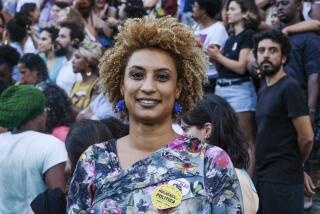Macao Hand-Over Complicated by Deadly Turf War
- Share via
MACAO — It wasn’t supposed to go this way.
Less than a year remains before Portugal surrenders its mostly benign and peaceful 450-year rule over this minuscule enclave on the southern coast of China. Everyone expected the most orderly of transitions to Chinese rule.
But that was before Chinese triads--secret societies that date to the Qing Dynasty on the Chinese mainland but that have since evolved into lethal organized crime units--began attacking prosecutors, police and prison officials.
In the most recent case, Dec. 14, a gunman believed to be connected to the local “14K” triad, which is fighting for a piece of the Macao gambling business, calmly assassinated a Portuguese prison officer and wounded another at a sidewalk cafe where the two officers were sipping vino verde and espresso. Both men were part of an elite unit brought in from Lisbon earlier this year to help supervise the Coloane Island prison, where imprisoned triad members, including notorious “14K” chieftain “Broken Tooth” Wan Kuok-koi, are held.
Violence against Portuguese and local lawmen began in March when the territory’s chief gambling inspector, Francisco Xavier Pinto do Amaral, was assassinated with a single shot to the back of his head near his office.
In addition to the prison guard who was killed this month at the European-style Cafe Caravel, gunmen also killed three local officers, a marine policeman in March, the armed chauffeur of a top Portuguese security official in April and another prison guard in November.
In May, gangsters set off a bomb in the car of Macao’s top police officer, who left his vehicle on a hillside street while he went jogging. In August, a senior Portuguese prosecutor in charge of triad-related cases and his pregnant wife were wounded in an attempted assassination.
Macao, with a population of just over 500,000, is more than 95% ethnic Chinese, most of whom also enjoy the right to Portuguese citizenship. The wave of violence has not panicked most of Macao’s several thousand Portuguese expatriates. “Their targets are always well chosen. They know what they want. They know the people they want to get,” said Jorge A.H. Rangel, the Macao government secretary for public administration.
“For ordinary Portuguese not involved in prison or police work,” said Jose Melo, a legal advisor to the government who has lived here since 1991, “there is no sense of insecurity. My children still walk to school. You can still see the governor and his wife in restaurants.”
The attacks apparently have not made big waves in Portugal, either. Like much of Western Europe, Portugal is preoccupied with the dawn of a new European currency. Jose Augusto de Alarcao Troni, a robust banker who was sipping a late-afternoon brandy at the old colonial Military Club here recently, complained that in a recent television interview with two of Portugal’s top politicians, “Macao was not mentioned once.”
But the violence has put a damper on preparations for the Dec. 20, 1999, hand-over, a miniature version of Hong Kong’s hand-over in July 1997.
After centuries of benign neglect, Portugal several years ago began building up Macao’s infrastructure and restoring European-style buildings, including the low-slung, bright pink Military Club and the canary yellow Bela Vista Hotel, which will become the residence of the Portuguese consul after the transfer of sovereignty.
The departing Portuguese have built a $1.1-billion airport, a new $100-million ferry terminal, a $56-million container port, two dramatic new bridges connecting the peninsula to the small islands of Taipa and Coloane, and refurbished the hospital.
But they also find themselves in the middle of what Rangel describes as a triad turf war connected to the gambling and vice trades. “These incidents are related to this period of transition for both Hong Kong and Macao,” said Rangel, whose family has lived in Macao for 10 generations. “At the time of the Hong Kong hand-over in 1997, some of their triads wanted to come here because they weren’t sure of the future in Hong Kong. Some triads from Taiwan also came.
“The problem is that Macao is so small. Too many triads involved in such a small place created leadership fights.”
More to Read
Sign up for Essential California
The most important California stories and recommendations in your inbox every morning.
You may occasionally receive promotional content from the Los Angeles Times.













